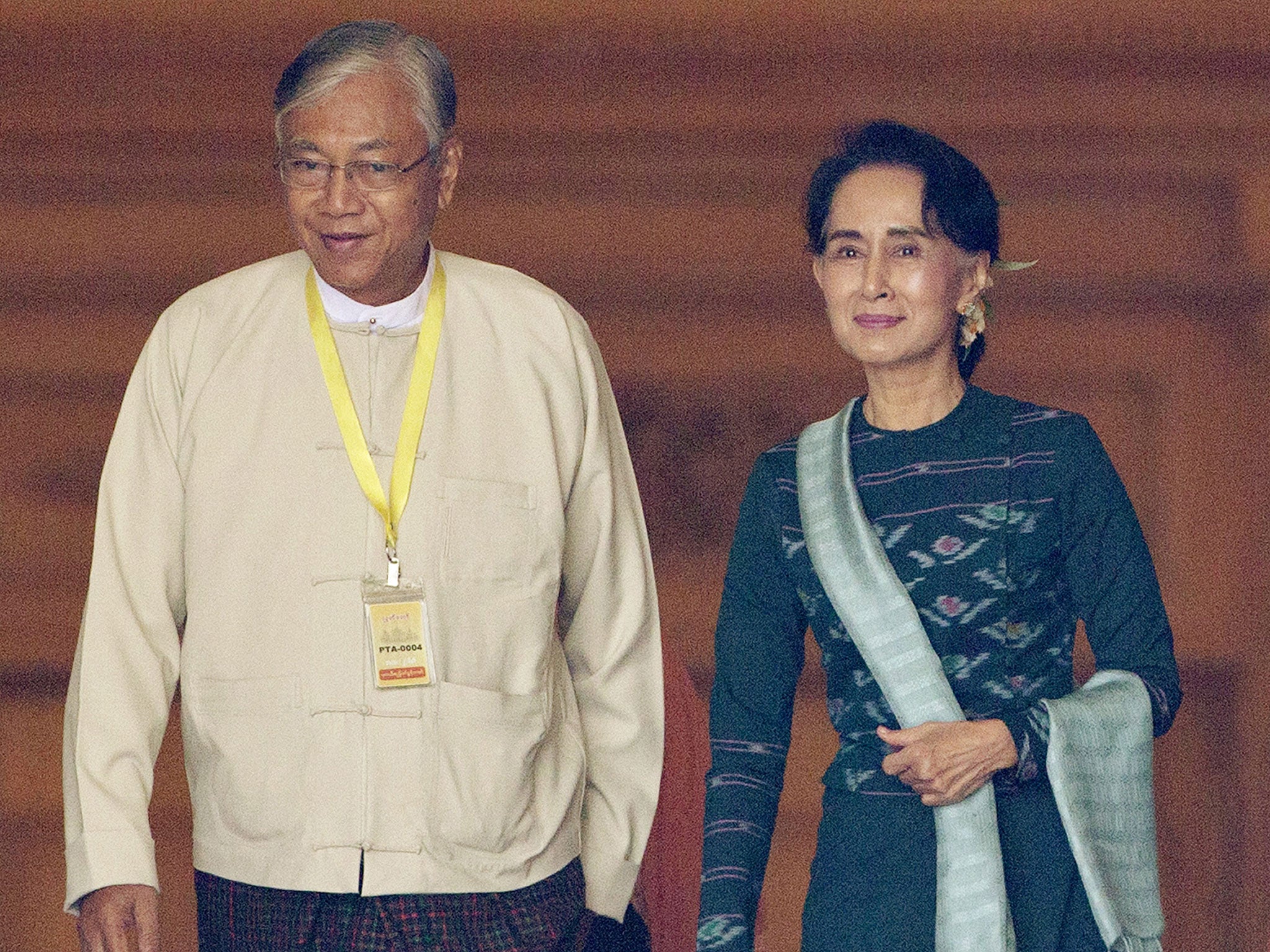Burma elects Htin Kyaw president as Aung San Suu Kyi's party comes to power
Suu Kyi is blocked from becoming president because of a constitutional clause that excludes anyone with a foreign spouse or children

Burma has entered uncharted waters after parliament elected Aung San Suu Kyi’s loyal friend U Htin Kyaw President.
When power is transferred on 31 March, the 69-year-old computer expert and former civil servant will become the first person without a military background to lead the country in more than 50 years.
But he wasted no time spelling out who will really be in charge. “Victory!” he declared after the count. “This is Aung San Suu Kyi’s victory!” And he told reporters as he left parliament after the vote: “I have become President because of Daw Aung San Suu Kyi’s goodwill and loving kindness.”
Former Oxford housewife Ms Suu Kyi, 70, is by far the most popular politician in Burma and the unchallenged leader of her party, the National League for Democracy (NLD). But she is barred from the presidency due to the fact that her sons are not Burmese citizens.
Despite lengthy negotiations, the military who still control Burma behind the scenes, refused to waive the problematic clause in the constitution, and she is therefore obliged to exercise power through a proxy.
U Htin Kyaw’s running mate from the NLD, Henry Van Tio, won 79 votes and will take the post of second vice-President.
In pictures: General elections in Myanmar
Show all 10“We are very satisfied with the result of the presidential election,” said Tun Win, a legislator from the Arakan National Party. “He really should be the leader. I hope he can lead this country to peace and stability, equality and implement the rule of law in this country.”
U Htin Kyaw makes a promising choice of puppet. He was one year below Ms Suu Kyi at an elite high school in Rangoon, his father was a co-founder with Suu Kyi and others of the NLD, and his wife is a newly-elected NLD MP.
He visited Ms Suu Kyi while she was still in detention, was by her side on her release in 2010, and was, until his dramatic elevation, on the executive committee of a charitable foundation she set up.
A graduate of London University’s now-defunct Institute of Computer Science, he also studied at a business school on the east coast of the United States.
During the parliamentary vetting process that preceded the vote, a military committee member objected to his candidacy on the grounds that he was not an MP, but he has relevant government experience, having spent 17 years as a civil servant, first in the Ministry of Labour, then the Foreign Ministry.
But the man who came second in Tuesday’s election and will become one of two vice-Presidents could cause Ms Suu Kyi serious problems. Myint Swe, candidate of the military MPs, is a former general who was a noted hardliner while still in uniform and a close ally of former Senior General Than Shwe, who ruled the country until 2011 and is still a power in the land.
Myint Swe replaced the reform-minded Khin Nyunt as head of military intelligence in 2004 after the former was ousted for being too close to Suu Kyi; three years later he was a key officer involved in crushing the democracy protests known as the Saffron Revolution. Yan Myo Thein, a political analyst, said: “Myint Swe is very close to former senior military officials, especially former supremo Than Shwe… [who may still be] influencing behind the scenes.”
His election also complicates Ms Suu Kyi’s international agenda. Since becoming chief minister of Rangoon in 2011, after returning to civilian life, Myint Swe gained a reputation for controversial business dealings and connection to the “cronies” who enriched themselves during the military regime years.
He is still on the United States’ list of people with whom American citizens and companies are barred from doing business – yet if U Htin Kyaw were to become incapacitated, Myint Swe would step into his shoes.
US State Department spokesman John Kirby said last Friday that the US “made its concerns known about this individual… we’ll monitor it going forward”.
Subscribe to Independent Premium to bookmark this article
Want to bookmark your favourite articles and stories to read or reference later? Start your Independent Premium subscription today.

Join our commenting forum
Join thought-provoking conversations, follow other Independent readers and see their replies